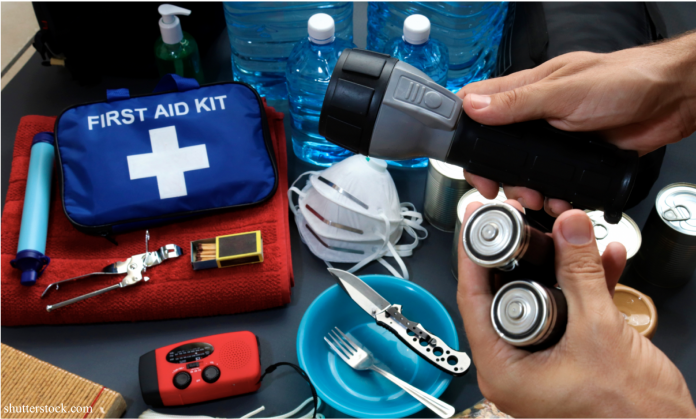“If you stay ready, you don’t have to get ready.”
Imagine one cold winter morning that you and your family woke up to no power, no heat or running water in your home, and within a mile circumference of your residents.
Imagine having to live in this condition for at least (30) days.
Imagine if there was no cell phone use, no internet, no television, no phone landlines, no lights, no cooking, no supermarkets available, no ATMs operable, no WAWA stores available, no corner stores available, no CVS, no Walmart, no Rite-Aid, no mass transportation, no traffic lights, no McDonald’s, No Chic-Fila, no restaurants open, no banks available, no gas stations, no Walmart, no hotels, no Western Union, no Pay Pal, no Cash App, no post office, no social media, no texting, no Google, no AI, no Tik Tok, no Facebook, no local news, no national news, no GPS navigation, no Twitter, no Uber eats, no Door Dash, no school openings, no hot showers, no operable toilet, no refrigeration for insulin medicine and the unavailability to go to a local pharmacy to get your prescribed medicine. There will be no need to go to the wine and spirits store or to get your hair and nails done.
There will be no need to get that fresh haircut or purchase the latest iPhone.
You will not be watching the game on your 80-inch flat screen or meeting your crew at the hottest new club to drink, dance, and socialize.
My SCOOP family, this particular article is not written to frighten or alarm you. This article is written with the intention of making and keeping you prepared for situations that may develop in the near future or even tomorrow.
When situations like the complete power shortage of entire geographical grids, major storms, flooding, and civil unrest occur, you must be prepared to protect your family and loved ones.
Emergency Preparedness
Emergency preparedness is a process. Emergency Preparedness is a mindset. Preparing for the unknown or things yet to come is a level of intelligence and clear common sense. Providing yourself and your family with the essential items and tools to remain safe and most importantly, alive should be a natural instinct.
Learning CPR, first-aid, self-defense, and how to survive on scarce food sources, just makes sense in the world we live in. These topics and conversations of survival are rare amongst the Black masses because we have become very comfortable and complacent with our oppression. Sisters and brothers, hypothetically thinking and accepting the narrative of “What If?” can save your life and the ones you love.
If you find the idea and reality of comprehensive survival and emergency preparedness too overwhelming or time-consuming, an effective way to make it manageable is to space out the different tasks throughout the months.
Are you and your family prepared to survive and maintain stable health for (30-60) days without the convenience of actually leaving your home? When emergencies and disasters strike your home or dwelling should be your safest refuge. In any situation we may have to face, we must remain resilient, strong, self-motivated, and able to Adapt!
The categories for Survival: Communication, Water supply/hydration, Food supply/nutrition, First-Aid, Medicine, Power/fuel, Sanitation, Hygiene, Proper Clothing, Equipment/tools, Toiletries, Evacuation routes, Documents, Keys, Self-defense, Bedding, and special needs.
Communication–In an extended power outage or other disaster, it is most likely that our landlines, cell phones, and internet connection will stop working. There are numerous communication devices (i.e. walkie-talkies) that are relatively inexpensive to purchase. Ham radios, Murs Radios, Citizen’s Band Radios, Satellite Phones, and Hand -Cranked Radios. Unfortunately, when the grid loses power and goes completely Black, certain family members or loved ones might not be in the safety of your home at the time and can’t make it back home. If that becomes the case, there should be a strategic meeting area (previously agreed upon by family members and close friends) that can be converged upon. Once this is successfully done, assessment and planning to return to the home base can occur. Again, home is the safest refuge, but certain situations may call for taking certain calculated risks to ensure that family members are safe.
Water Supply–Bottled water is a commodity that should consistently be stored and consumed by each family member on a daily basis. Around (60-70%) of our body is made up of water, and we can only live (3-5) days without fluids. Cases of water are easily accessible and can be stored in your home quite easily. The shelf life remains longer when stored in a cool dry place in your home. Collect and store (5) gallon jugs as well as cases of water. Keep in mind, that your water source will have to be used for drinking, washing, cleaning, and sterilization when needed. Also, keep in mind to store enough water for flushing waste. If the main water source gets cut off, there will be no operable plumbing.
Khabyr Hadas is a teacher, historian, and author of numerous books on the Black experience.
He is a (20) year member of the Universal Negro Improvement Association and African Communities League and serves the post of Archivist for Thomas W. Harvey Memorial division #121 based in Philadelphia, Pennsylvania khabyrhadas@gmail.com
**********
Thank you for reading Khabyr Hadas’ article on scoopusamedia.com. To read additional articles of interest, please subscribe to Scoop USA Media. Print subscriptions are $75.00 and online subscriptions (Print, Digital and Vizion) are $90. (52 weeks/1 year)


